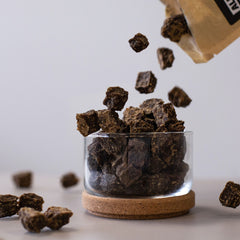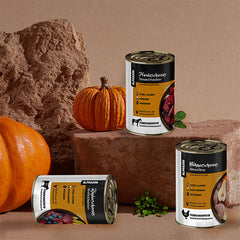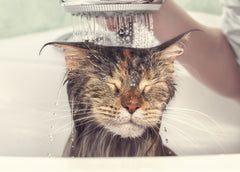When the litter box becomes a problem: What to do if your cat has diarrhea?
Suddenly, the litter box smells worse than usual, and the consistency is... well, not what it used to be? Diarrhea in cats is not uncommon, but it's often a sign that something is wrong. Whether it's due to stress, improper feeding, or serious illness – there are many reasons why your cat might have diarrhea. The important thing is: You need to act and find the cause quickly to help your furry friend.
In this blog, I'll tell you what causes diarrhea in cats , which home remedies help, and when you should definitely see a vet.
Cat has diarrhea – what does that actually mean?
Diarrhea, also called diarrhea, means that your cat's stool is softer, waterier, or more frequent than normal. Sometimes it's even mucous or contains blood. A single "accident" is often harmless. But if diarrhea lasts for more than a day, you should take a closer look.
Cat diarrhea: common causes
1. Feed change
- A new food or a change that is too quick can upset your cat's sensitive gastrointestinal tract.
- Tip: Always introduce new food slowly by gradually mixing it into the old food.
2. Food intolerances and allergies
- Some cats are sensitive to certain ingredients such as grains, lactose or certain types of meat.
- Caution: Watch for symptoms such as vomiting or itching in addition to diarrhea.
3. Spoiled food or toxins
- Poor food, spoiled leftovers or poisonous plants can lead to acute gastrointestinal problems.
4. Parasites
- Worms, Giardia or coccidia are common causes of diarrhea in cats.
- Symptoms: Weight loss, loss of appetite and bloated stomach.
5. Infections and diseases
- Viruses (e.g. feline distemper) or bacteria (e.g. salmonella) can cause severe diarrhea.
- Chronic diseases such as IBD (inflammatory bowel disease) or pancreatitis are also possible.
6. Stress and anxiety
- A move, new roommates or a change in daily routine can trigger stress, which in turn causes diarrhea.
- Solution: Create routines and places to retreat.
7. Medications
- Antibiotics or other medications can disrupt your cat's intestinal flora and cause diarrhea.
8. Hairballs
- Long-haired cats in particular swallow a lot of hair when grooming, which can irritate the intestines.
Symptoms: When does diarrhea in cats become a concern?
A single bout of diarrhea is usually harmless. However, if additional symptoms occur, you should take action:
- Severe diarrhea lasting several days
- Blood or mucus in the stool
- Vomiting and loss of appetite
- Fever or fatigue
- Weight loss
When should you go to the vet?
- If diarrhea lasts longer than 24 hours .
- Kittens, older cats , or sick animals can quickly become dehydrated!
- If the stool has unusual colors (e.g. black or bloody).
First aid for diarrhea: What can you do?
1. Food break for the intestines
- Let your cat fast for 12–24 hours (not kittens!). This allows the gastrointestinal tract to settle.
2. Provide water
- Make sure your cat drinks enough to avoid dehydration.
3. Offer a light diet
- Feed easily digestible food:
- Cooked chicken without spices
- Cooked rice
- Cottage cheese in small quantities
4. Use probiotics
- Probiotics help rebuild intestinal flora. They are available in powder form from veterinarians or specialist retailers.
Home remedies for diarrhea in cats
Some gentle home remedies can help your cat overcome diarrhea more quickly:
- Healing clay: Half a teaspoon in the food binds toxins in the intestines.
- Pumpkin: Cooked pumpkin soothes the intestines.
- Psyllium husks: Help regulate stool.
- Chamomile tea: Mix cooled into drinking water – soothes the stomach.
Important: Home remedies are only suitable for mild diarrhea. Consult your veterinarian if you are unsure.
Avoiding diarrhea in cats: Prevention is key
A healthy lifestyle helps prevent diarrhea:
- High-quality food: Make sure the food is grain-free or contains no added sugar.
- Regular deworming: Have your cat dewormed regularly.
- Clean litter box: Cats avoid dirty litter boxes and thus develop stress.
- Slow food change: Gradually get your cat used to new food.
- Minimize stress: Retreats and routine help your cat feel safe.
Frequently asked questions about cat diarrhea
“Why does my cat suddenly have diarrhea?”
Sudden diarrhea can be triggered by a change in diet, stress, or parasites. Monitor your cat closely.
“How dangerous is diarrhea in cats?”
Short-term diarrhea is usually harmless. However, dehydration can quickly occur in kittens or older cats.
“Does home cooking help with diarrhea?”
Yes! Bland foods like boiled chicken and rice help soothe the intestines.
Conclusion: Cat has diarrhea? This is what you should do
Diarrhea in cats is common and often harmless. However, you should monitor the symptoms and take action if the diarrhea persists or worsens.
The most important points summarized:
- Common causes are changes in diet, parasites or stress.
- Watch for symptoms such as vomiting, blood in the stool, or fatigue.
- Home remedies such as bland foods, healing clay and probiotics can help.
- If diarrhea lasts for a long time or is severe, consult your veterinarian!
With proper care, patience, and a healthy diet, your cat will stay fit and happy. After all, your furry friend's only "leavings" should be joy and purring—not smelly diarrhea! 🐾

















